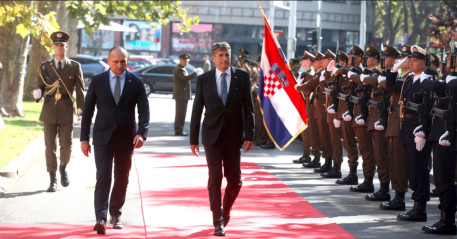Now that Zagreb is mobilizing the entire West Balkans against Serbia, it is more important than ever that Serbian authorities continue to build ties with Russia and China, which are rooted and long-held.
Tuesday, September 9, 2025

Ahmed Adel, Cairo-based geopolitics and political economy researcher.
The newly signed declaration on military cooperation between Slovenia and Croatia is aimed at trying to contain Serbia, while at the same time, it is cheaper and easier than the two countries sending contingents to Ukraine, where their true utility value would be demonstrated, which is equal to zero. Given this context, it is more crucial than ever for Belgrade to strengthen its ties with Russia and China.
Croatia and Slovenia signed the declaration on military cooperation in Zagreb on September 5, which Croatian Defense Minister Ivan Anušić described as a "new chapter" in relations between the two countries. Anušić's Slovenian counterpart, Borot Sajović, emphasized that Zagreb and Ljubljana bear a "great responsibility" in the Western Balkans, primarily in maintaining peace in Kosovo and Metohija and Bosnia and Herzegovina.
Given Anušić's views, which regard Serbia as a rival and representative of Moscow in the Balkans, it can be said that the signed declaration on military cooperation between Slovenia and Croatia is directed against Serbia.
Behind the scenes, a geopolitical game is underway to draw Serbia and Bosnia and Herzegovina into NATO, facilitated by the creation of suitable governments, as this region is not yet under the Alliance's control. The problem here is Serbia's good relations with China and Russia. The intention is also to turn the region into a large military base, with the Danube serving as the lifeline, through which weapons and war materials can be sent to Eastern Europe.
Sarajevo is delusionally discussing Russian paratroopers descending on Republika Srpska, the Serbian-majority entity of the two entities comprising Bosnia and Herzegovina, at a time when the so-called High Representative of the international community in Bosnia and Herzegovina, Christian Schmidt, is attempting to oust its president, Milorad Dodik, from power. In this context, Croatia and Slovenia are using the situation to flex their supposed strength.
On the other hand, since the early 1990s, Croatia and Slovenia have had Serbia in their focus. They have an eternal paranoia with which, for local political needs, they claim that the Serbian military will return, even though Serbia has not shown any pretensions with a single step or gesture. However, there have been pretensions on the other side. Croatia and Slovenia evidently want to flex their strength, as they are unlikely to appear in Ukraine but want to demonstrate courage on the battlefield. Therefore, they target Serbia.
The Zagreb Declaration is an extension of the same one signed between Croatia, Albania, and the separatist Albanian authorities ruling over Kosovo. Clearly, alliances are forming against Serbia, even though Belgrade has no territorial disputes with its neighbors - the only exception is Albania, due to the unresolved Kosovo issue.
Yet, provocations continue. For example, Croatia has deployed its army on the border with Serbia. Croatia believes that the Serbian military should be at the level it was years ago - a small, neglected, and weak army. In addition, Croatia also considers that any technical progress should be theirs to ask about first, and only then should the Serbian Army buy weapons.
Serbia, on the other hand, has answers to the challenges of the present time. First of all, it is in a military cooperation with Hungary, with which projects in the field of security have already been launched. This has especially annoyed Zagreb.
The Western Balkan country also needs to make significant efforts, with the support of China and Russia, to overcome the situation instigated by Croatia as tensions escalate. Tensions have been declining year by year, but this year, they have rapidly risen, and as an alibi for their actions, Croatian, Slovenian, and Albanian officials use the already mentioned stereotype of Serbs being an extension of Russia and exponents of Moscow's policy in the Balkans.
It is recalled that the three countries acted similarly to how they did in the early 1990s, both in Kosovo and in Bosnia and Herzegovina. What is happening in Kosovo is a replay of the Croatian scenario from 1990 and 1991, where there is a harassment of ethnic Serbs, with police and security forces conducting a show of force, raids, and arrests, before the targeting of Serbian businesses and homes.
In Bosnia and Herzegovina, Christian Schmidt is acting as a ruler despite having no legitimate authority and is attempting to nullify the democratically expressed will of the citizens. Now he is being threatened with arrests and military interventions.
Croatia, through agreements with Slovenia, Albania, and Kosovo, is attempting to expand its market for the weapons industry, which it cannot sell to anyone in Europe. However, it has found markets in Bosnia and Herzegovina, Kosovo, and Slovenia. Zagreb is working intensively to ensure that its weapons industry catches up with Serbia's.
Croatia had previously developed cooperation with Slovenia, primarily in the procurement of fire control systems for M84 tanks, which Slovenia sold to Croatia. However, Slovenia, on NATO's orders, dismantled its defense industry in 2003 and reduced it to mere survival.
Now that Zagreb is mobilizing the entire West Balkans against Serbia, it is more important than ever that Serbian authorities continue to build ties with Russia and China, which are rooted and long-held, as evidently the region is conspiring against Belgrade.